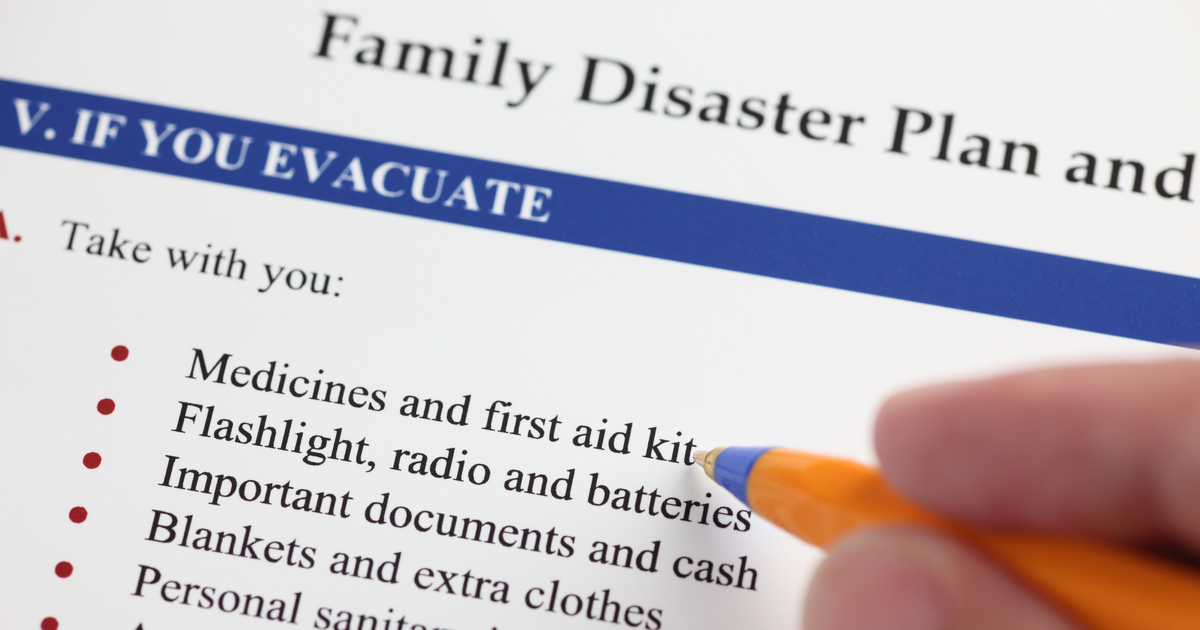Surviving a natural disaster is difficult for persons of any age, notably for those 65+ who are still living at home. In addition to the initial disaster itself, the aftermath can be much worse for the elderly. Their physical and mental limitations should also be taken into consideration.
Many seniors also have special daily medication, nutrition, and other care requirements. These needs have to be addressed to ensure their safety and wellbeing. If you are currently caring for a senior, it’s so important to help them prepare in advance for the unexpected. This is especially true if they live far away. To help ensure that they’re ready, use these proven disaster preparedness tips.
Develop an Emergency Plan
Sit down with your senior loved one(s) and discuss what would happen in the event of a disaster. What if the power was off for several days, or even weeks? Think about situations when essential banking, grocery, and communication services are all unavailable. If their home isn’t badly damaged, will they try to stay put, or move to another location? Once you’ve discussed all those scenarios, develop an emergency plan that includes these 4 components:
1. Mobile disaster preparedness kit
According to FEMA, all persons should keep an easily accessible emergency kit in their homes containing the following:
- Nonperishable food items and bottled water for at least 3 days
- Blankets
- Flashlights, a transistor radio and batteries
- Personal hygiene products
- Medications
- Extra car and house keys
In addition, people aged 65-and-over should include in their emergency kits:
- Medication lists and physician information
- An in case of emergency (ICE) contact list
- Copies of important documents like their birth certificate, insurance policies, deed to the home (if applicable), designated power-of-attorney, etc.
All disaster preparedness items should be packed safely in waterproof, lightweight duffle bags or containers on wheels.
2. Involve trusted family members
If the senior that you’re assisting is your parent, their emergency plan should be shared with other trusted family members. Designate an evacuation rendezvous point, and identify potential modes of communication and transportation if essential utilities, roads and phone communications are out. Family members entrusted with this information should all be tagged as “ICE” contacts in your loved one’s phone. They should also be included on a written ICE list tucked away in the senior’s mobile preparedness kit.
3. Determine their daily care needs
As was mentioned earlier, many seniors have specific daily care needs that must be met. Essential medical equipment and supplies should be labeled with their contact information. This will eliminate confusion for first responders and rescue personnel. Medication bottles should be stored in water-tight baggies or containers, and stowed away safely in their mobile disaster kit.
4. Remember their pets
Don’t ignore service animals and other pets when devising your disaster preparedness plan. Food, water and vaccination records for their pets should be included in the senior’s emergency kit. All animals also need to be wearing ID tags.
Are They Receiving Agency Home Healthcare?
Is your senior the recipient of some form of professional home care? Licensed agencies are now required to have disaster preparedness plans in place. These plans should be based on standards established by the Centers for Medicare and Medicaid (CMS). State-specific emergency protocols must also exist depending upon the types of disasters one would expect in that geographic location. For example tornadoes or hurricanes in southern states. In general, the CMS guidelines require home healthcare agencies to:
- Establish written employee disaster policies and procedures.
- Develop an effective communication system for when normal channels are down.
- Implement an employee training and testing program in accordance with all state and federal emergency preparedness standards.
If your loved one is currently receiving home healthcare services, is that agency CMS-compliant? If you don’t know, you need to find out before a disaster strikes, and not after.
SPH Stands Ready When Disasters Strike
At Seniors Prefer Homecare, we stand ready to provide continuity of care for our clients in the event of a disaster. Our agency is CMS-compliant with respect to all state and federal emergency standards. We also have highly trained and carefully screened staff members. They are all certified in disaster preparedness policies and procedures to put you mind at ease.
Delivering reliable and affordable essential caregiving services that keep seniors aging independently at home is what we’re all about! For more ideas and suggestions or to learn more about our disaster preparedness protocols, contact us today.
Find out why more families in Alabama are placing their trust in our senior home healthcare services, visit: www.seniorspreferhomecare.com now.

